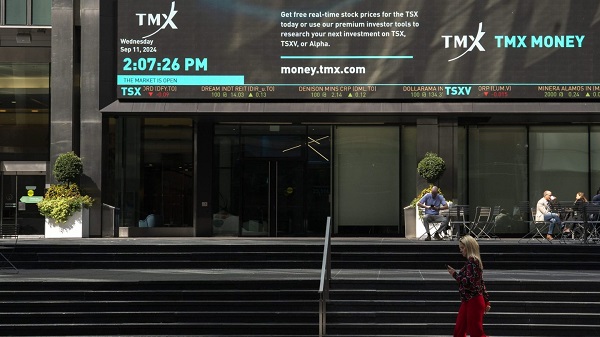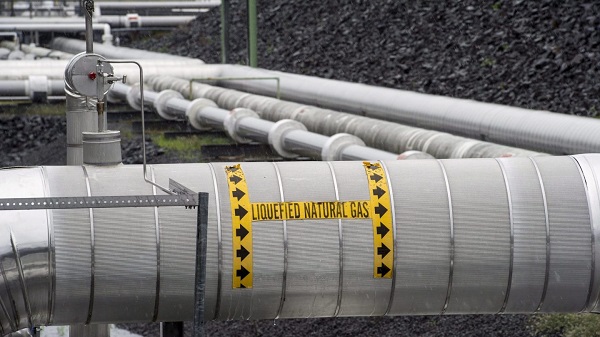Canadian Energy Centre
Oil and gas companies are once again the top performers on the TSX. Why do people still listen to the divestment movement?

From the Canadian Energy Centre
By Gina Pappano
The TSX30—the annual ranking of the top-performing stocks on the Toronto Stock Exchange—was recently released and, once again, oil and gas companies made up the lion’s share of the list.
Half of the top companies (11 producers and four energy service companies) are in the oil and gas sector.
Share prices have been driven up due to energy supply and security concerns and ever-increasing demand for oil and gas. The industry and its investors have enjoyed extraordinary three-year returns. The average share price return for the 15 oil and gas companies in the TSX30 was 210 per cent.
But what about the large endowment funds, pension plans, institutional funds and, more recently, banks that have bowed to pressure from divestment-promoting activists to stop investing in the natural resource sector?
In removing oil and gas from their investment pool, they have ignored their responsibility to their beneficiaries, who have missed out on these remarkable returns.
Trustees have a fiduciary duty to act in the best interest of their beneficiaries, which in this case means maximizing the risk-adjusted return for their clients.
But for ideological reasons, oil and gas companies are often being left out of the investment equation.
What’s more, the divestors aren’t even achieving their ideological goal.
Abundant energy is the prerequisite for modern life. Divestment does not stop oil and gas production because it does nothing to reduce demand. After more than a decade of divestment pledges, demand for oil and gas has only continued to go up. This demand is projected to continue to grow for years to come.
If Canada does not supply the oil and gas the world wants and needs, it will be supplied from elsewhere, including by authoritarian regimes in poorly regulated, undemocratic countries that are less responsible and less environmentally friendly.
It would be better if Canadian companies like those on the TSX30 were the ones to step up and meet the world’s ever-growing energy needs.
It would be better for Canadians as well. Canada is blessed with abundant natural resources, and oil and gas is central to our prosperity. All of the companies on the TSX30 list rely on the oil and gas sector to fuel their business, from industrials to mining, to aviation, technology and yes, even to renewable energy.
Investing in the Canadian oil and gas sector means investing in energy companies that can and should be the suppliers of the energy demanded by our power-hungry world.
These companies have high environmental and governance standards, are driven to innovate—an essential process for emissions reduction—and have had some of the strongest returns on the TSX in recent years.
Can our banks and fund managers possibly continue to ignore the significant value in the energy space? Only time will tell.
Gina Pappano is the former head of market intelligence at the Toronto Stock Exchange and TSX Venture Exchange and executive director of InvestNow, a non-profit dedicated to demonstrating that investing in Canada’s resource sectors helps Canada and the world. Join the movement and pass the InvestNow resolution at investnow.org.
2025 Federal Election
Canada’s pipeline builders ready to get to work

From the Canadian Energy Centre
“We’re focusing on the opportunity that Canada has, perhaps even the obligation”
It was not a call he wanted to make.
In October 2017, Kevin O’Donnell, then chief financial officer of Nisku, Alta.-based Banister Pipelines, got final word that the $16-billion Energy East pipeline was cancelled.
It was his job to pass the news down the line to reach workers who were already in the field.
“We had a crew that was working along the current TC Energy line that was ready for conversion up in Thunder Bay,” said O’Donnell, who is now executive director of the Mississauga, Ont.-based Pipe Line Contractors Association of Canada (PLCAC).
“I took the call, and they said abandon right now. Button up and abandon right now.
“It was truly surreal. It’s tough to tell your foreman, who then tells their lead hands and then you inform the unions that those three or four or five million man-hours that you expected are not going to come to fruition,” he said.

Workers guide a piece of pipe along the Trans Mountain expansion route. Photograph courtesy Trans Mountain Corporation
“They’ve got to find lesser-paying jobs where they’re not honing their craft in the pipeline sector. You’re not making the money; you’re not getting the health and dental coverage that you were getting before.”
O’Donnell estimates that PLCAC represents about 500,000 workers across Canada through the unions it works with.
With the recent completion of the Trans Mountain expansion and Coastal GasLink pipelines – and no big projects like them coming on the books – many are once again out of a job, he said.
It’s frustrating given that this could be what he called a “golden age” for building major energy infrastructure in Canada.
Together, more than 62,000 people were hired to build the Trans Mountain expansion and Coastal GasLink projects, according to company reports.
O’Donnell is particularly interested in a project like Energy East, which would link oil produced in Alberta to consumers in Eastern and Atlantic Canada, then international markets in the offshore beyond.
“I think Energy East or something similar has to happen for millions of reasons,” he said.
“The world’s demanding it. We’ve got the craft [workers], we’ve got the iron ore and we’ve got the steel. We’re talking about a nation where the workers in every province could benefit. They’re ready to build it.”

The “Golden Weld” marked mechanical completion of construction of the Trans Mountain Expansion Project on April 11, 2024. Photo courtesy Trans Mountain Corporation
That eagerness is shared by the Progressive Contractors Association of Canada (PCA), which represents about 170 construction and maintenance employers across the country.
The PCA’s newly launched “Let’s Get Building” advocacy campaign urges all parties in the Canadian federal election run to focus on getting major projects built.
“We’re focusing on the opportunity that Canada has, perhaps even the obligation,” said PCA chief executive Paul de Jong.
“Most of the companies are quite busy irrespective of the pipeline issue right now. But looking at the long term, there’s predictability and long-term strategy that they see missing.”
Top of mind is Ottawa’s Impact Assessment Act (IAA), he said, the federal law that assesses major national projects like pipelines and highways.
In 2023, the Supreme Court of Canada found that the IAA broke the rules of the Canadian constitution.
The court found unconstitutional components including federal overreach into the decision of whether a project requires an impact assessment and whether a project gets final approval to proceed.
Ottawa amended the act in the spring of 2024, but Alberta’s government found the changes didn’t fix the issues and in November launched a new legal challenge against it.
“We’d like to see the next federal administration substantially revisit the Impact Assessment Act,” de Jong said.
“The sooner these nation-building projects get underway, the sooner Canadians reap the rewards through new trading partnerships, good jobs and a more stable economy.”
Canadian Energy Centre
First Nations in Manitoba pushing for LNG exports from Hudson’s Bay

From the Canadian Energy Centre
By Will Gibson
NeeStaNan project would use port location selected by Canadian government more than 100 years ago
Building a port on Hudson’s Bay to ship natural resources harvested across Western Canada to the world has been a long-held dream of Canadian politicians, starting with Sir Wilfred Laurier.
Since 1931, a small deepwater port has operated at Churchill, Manitoba, primarily shipping grain but more recently expanding handling of critical minerals and fertilizers.
A group of 11 First Nations in Manitoba plans to build an additional industrial terminal nearby at Port Nelson to ship liquefied natural gas (LNG) to Europe and potash to Brazil.
Robyn Lore, a director with project backer NeeStaNan, which is Cree for “all of us,” said it makes more sense to ship Canadian LNG to Europe from an Arctic port than it does to send Canadian natural gas all the way to the U.S. Gulf Coast to be exported as LNG to the same place – which is happening today.
“There is absolutely a business case for sending our LNG directly to European markets rather than sending our natural gas down to the Gulf Coast and having them liquefy it and ship it over,” Lore said. “It’s in Canada’s interest to do this.”
Over 100 years ago, the Port Nelson location at the south end of Hudson’s Bay on the Nelson River was the first to be considered for a Canadian Arctic port.
In 1912, a Port Nelson project was selected to proceed rather than a port at Churchill, about 280 kilometres north.
The Port Nelson site was earmarked by federal government engineers as the most cost-effective location for a terminal to ship Canadian resources overseas.
Construction started but was marred by building challenges due to violent winter storms that beached supply ships and badly damaged the dredge used to deepen the waters around the port.
By 1918, the project was abandoned.
In the 1920s, Prime Minister William Lyon MacKenzie King chose Churchill as the new location for a port on Hudson’s Bay, where it was built and continues to operate today between late July and early November when it is not iced in.
Lore sees using modern technology at Port Nelson including dredging or extending a floating wharf to overcome the challenges that stopped the project from proceeding more than a century ago.
He said natural gas could travel to the terminal through a 1,000-kilometre spur line off TC Energy’s Canadian Mainline by using Manitoba Hydro’s existing right of way.
A second option proposes shipping natural gas through Pembina Pipeline’s Alliance system to Regina, where it could be liquefied and shipped by rail to Port Nelson.
The original rail bed to Port Nelson still exists, and about 150 kilometers of track would have to be laid to reach the proposed site, Lore said.
“Our vision is for a rail line that can handle 150-car trains with loads of 120 tonnes per car running at 80 kilometers per hour. That’s doable on the line from Amery to Port Nelson. It makes the economics work for shippers,” said Lore.
Port Nelson could be used around the year because saltwater ice is easier to break through using modern icebreakers than freshwater ice that impacts Churchill between November and May.
Lore, however, is quick to quell the notion NeeStaNan is competing against the existing port.
“We want our project to proceed on its merits and collaborate with other ports for greater efficiency,” he said.
“It makes sense for Manitoba, and it makes sense for Canada, even more than it did for Laurier more than 100 years ago.”
-

 2025 Federal Election1 day ago
2025 Federal Election1 day agoOttawa Confirms China interfering with 2025 federal election: Beijing Seeks to Block Joe Tay’s Election
-

 Energy2 days ago
Energy2 days agoIndigenous-led Projects Hold Key To Canada’s Energy Future
-

 2025 Federal Election1 day ago
2025 Federal Election1 day agoHow Canada’s Mainstream Media Lost the Public Trust
-

 Energy2 days ago
Energy2 days agoMany Canadians—and many Albertans—live in energy poverty
-

 2025 Federal Election20 hours ago
2025 Federal Election20 hours agoBREAKING: THE FEDERAL BRIEF THAT SHOULD SINK CARNEY
-

 2025 Federal Election1 day ago
2025 Federal Election1 day agoReal Homes vs. Modular Shoeboxes: The Housing Battle Between Poilievre and Carney
-

 Business2 days ago
Business2 days agoCanada Urgently Needs A Watchdog For Government Waste
-

 International2 days ago
International2 days agoPope Francis has died aged 88








